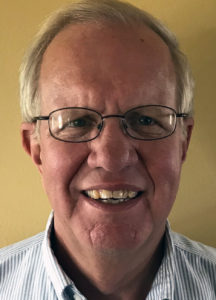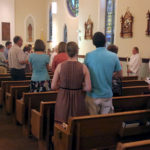By Barb Arland-Fye
The Catholic Messenger
Deacon Joe Rohret recalls his visit with a teenager dying of cancer who asked him, with tears in her eyes, “Am I going to go to hell?” He asked her, “Do you love God?” She responded yes. “Then you’re not going to go to hell,” the deacon assured her. She had other questions regarding her beliefs and admitted to yelling at God. “He can take it,” the deacon said.

Suffering is a part of life. “It’s something Christ experienced … it’s something we have to embrace,” said Deacon Rohret of St. Peter Parish-Cosgrove. He witnesses how patients, families and health care providers that he visits at the University of Iowa Stead Family Children’s Hospital give meaning to suffering. “You see the joy of life, even when it’s not going well. Suffering draws us closer to Christ and, oftentimes, to family. It’s not all gloom and doom; there’s joy, but it’s a different kind of joy.”
That’s not the perspective of one of his adult relatives who, if diagnosed with dementia, would go to Oregon, where physician-assisted suicide is legal. Fear of suffering and loss of autonomy continue to be factors in the ongoing debate about physician-assisted suicide.
Last month, The American Academy of Family Physicians (AAFP) announced that it had changed its position on physician-assisted suicide to “engaged neutrality.” The AAFP, in fact, no longer uses the term physician-assisted suicide, referring to it instead as “medical aid in dying.”
An article by Compassion & Choices regarding AAFP’s decision referred to a report that states “Patient requests for [medical aid in dying] invite physicians to have the kind of difficult conversations that are too often avoided. They open opportunities to explore the patient’s goals and concerns, to learn what about the situation the individual finds intolerable and to respond creatively to the patient’s needs” (PRN Newswire, 10-9-18).
A week later, the Catholic Medical Association (CMA) responded with a statement from its president, Peter Morrow, M.D. “We at the CMA are dedicated to preserving life from birth to natural death and will continue to remain staunchly opposed to any form of assisted suicide. It goes against natural law.”
Some Catholics and non-Catholics view that teaching as legalistic and lacking compassion. Church leaders in the Diocese of Davenport say that is not true. “In my own experience as a minister and a family member, I have found that when a loved one is terminally ill, we have the opportunity to be compassionate by gently washing, dressing and caressing them, thereby loving them to the end,” Bishop Thomas Zinkula said in a guest opinion last December in the Quad-City Times.
Deacon Dan Freeman of St. Andrew Parish-Blue Grass is among six individuals in the Diocese of Davenport certified to provide end-of-life training through an initiative of the Iowa bishops called Supportive Care Iowa.

As a result of that training, Deacon Freeman plans to offer adult formation in his parish on end-of-life directives.
People need to start talking about these directives, from a Catholic perspective, when they are healthy but getting older, when they are dealing with a serious illness and during the final stages of life. “We don’t want the secular world determining how we’ll die,” he said.
“Some people want freedom to choose. Our freedom is in recognizing that we are free to surrender to the God who loves us,” Deacon Freeman told The Catholic Messenger. “To me, it comes down to: ‘What is our purpose in life? It is either to love God and others or to choose selfishness.” In the quest to live life to the fullest, “we lose sight of how we can minister to others” dealing with end-of-life issues, he said.
Deacon Rohret says that in his ministry to families at the children’s hospital, they sometimes wonder why God allowed their child’s illness to happen. “God isn’t doing this,” Deacon Rohret tells them. Disease and death came into the world, but “God is right here with you, comforting you.”
Supportive Care Iowa
The Iowa bishops’ “Supportive Care Iowa” project is available to help people seeking guidance on making decisions about end-of-life health care that is aligned with Catholic values. People generally can’t foresee situations that will arise in regard to their health. It is important to choose a person who knows you and can speak on your behalf if you are not capable of doing so.
Trained volunteers, called “Catholic Advanced Care Planning Consultants,” can help individuals with the completion of documents that designate another person with power of attorney for health care in the event of incapacity. It is the diocese’s goal to help Catholics have these faith-filled discussions with friends and family in advance of a crisis and to provide guidance in completing advance directive forms in alignment with Catholic moral principles. This service is available without charge. Please contact the diocese’s Social Action Director Kent Ferris at (563) 888-4211 if you are interested in this service or would like to be trained as a Catholic Advanced Care Planning Consultant.











